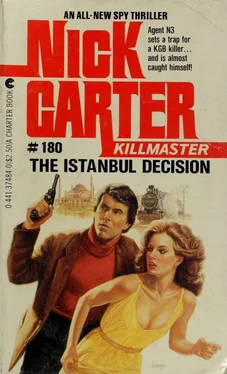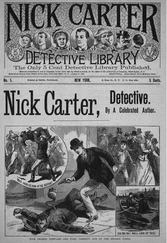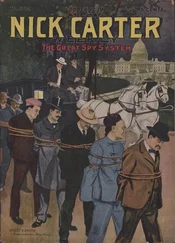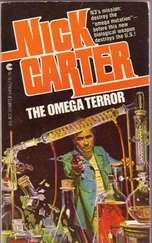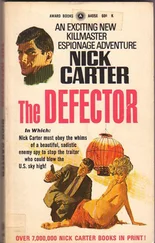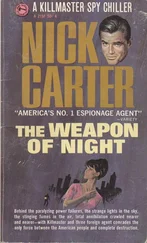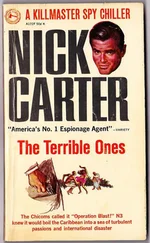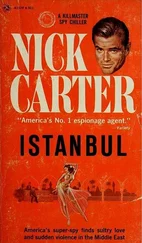A few seconds later a third man came in and stood just inside the doorway. He was taller than the other two, his bearing more regal. His snow white hair was swept back off his forehead in a sharp widow's peak, and from beneath his arched brows his dark eyes darted, taking in everything at a glance.
Cynthia didn't need an introduction. The mad glint in those eyes was unmistakable. It could only be Nikolai Fedorovich Kobelev himself.
"Tatiana!" he exclaimed when those eyes finally lit upon her.
She tried to force a smile.
"I cannot let you take her," said the old nun, stepping forward.
"What?" asked Kobelev in French, turning to her in bemused amazement.
"She is a ward of the hospital. She must remain here until the doctor has signed her letters of discharge. I am sorry, but these are the rules."
"I don't care about your rules. This is my daughter."
"I am sorry, but I cannot allow it." She pushed herself between the goon with the gun and situated herself squarely between Kobelev and Cynthia. She was being foolish, thought Cynthia, but brave. "You have no right to barge in here and take one of my patients!" the old woman snapped. "We have procedures to follow and they simply cannot be ignored."
Kobelev snorted a short laugh, then turned to Cynthia. "Such is the security with which the Americans provide you," he said to her in Russian. Then he motioned to one of his men, who took the old woman forcibly by the arm and pulled her out of the way.
"You must not take her!" the old nun shouted, stamping her foot on the toe of the man who held her. He raised his foot in pain, and she pulled away and hobbled toward Kobelev. "In the name of the Church and all that is holy to man and God, I demand you leave these premises immediately!"
She reached him and grabbed him by the arm, although whether to restrain him or support herself was not altogether clear. Kobelev s eyes flashed angrily, and with a quick jerk of his head, he signaled the man with the gun. A short burst of gunfire and the nun collapsed against the bed.
"Sister!" Cynthia shouted mournfully, and Kobelev swung around to her wide-eyed. And in mat brief instant the weeks of work by the team of plastic surgeons, the hours of studying films of Tatiana, the way she moved, tossed her head, held herself in her wheelchair, of memorizing every known fact of her background, and of imitating her voice until every intonation and nuance was honed to perfection, were lost. For that anguished moment, she was Cynthia Barnes, not Tatiana Kobelev.
Carter peeked out from a darkened doorway in the headquarters of the Freie Deutsche Jugend, the Communist youth organization. The street was deserted in either direction except for a car parked against the opposite curb. Whether it was private or official was impossible to tell through the curtain of falling rain, but it was occupied. A trail of exhaust rose from its tailpipe.
So far he'd been lucky. In the two hours he'd spent in the Eastern Sector he'd encountered no one. Unlike its western counterpart, East Berlin is virtually deserted at night. Except for a few main thoroughfares, even the streetlights are turned off. He'd managed to walk the mile and a half to the Brandenburg Gate, slip in a side door, ascend the wrought-iron staircase to the roof, stash his cylinder, then slip away without being seen. The only person who might have noticed him, the guard stationed atop the gate to watch the wall, which was only a few hundred yards away, never stopped chewing his sandwich.
Now all that remained was to find Mariendorfstrasse, assess the security, then maybe get a few hours of sleep on a bench somewhere before the actual confrontation with Kobelev. According to Kliest, Mariendorfstrasse lay only two blocks north of his present position. He could walk it in a minute, except he had no wish to be seen, and his coal-stained clothes and blackened hands and face would certainly arouse suspicion.
A door opened in a building across the way, and an oblong of light spilled into the rain. Two men and a woman, singing a drinking song and laughing, staggered over to a car, pulled open its doors, and got in. Then the driver rolled the car into the center of the street, turned left, and disappeared. Carter waited until he heard them shifting into third in the next block before he pulled his coat collar up and started down the street.
No doubt a trap had been laid for him in Mariendorfstrasse. He expected it. He'd have lost respect for Kobelev if one hadn't. The trick was to reconnoiter early, figure a way to spring the trap without getting caught, and in the process get close enough to Kobelev to get off a shot.
It was a good bet Kobelev would show. If the information about his slipping prestige was accurate, it would mean he couldn't entrust killing Carter to a mere minion. He'd have to come himself to make sure the job was done right. And when he did show, Carter would kill him. This time there would be no mistake.
Mariendorfstrasse was dark, darker even than the other streets he'd passed through. It was after four-thirty by this time, and in other streets lights were coming on as people began to make ready to leave for work on the early shifts in the factories along Friedrichstrasse and Unter den Linden that opened at six. There were no such lights here, though. Here everything was black as ink.
Even the house numbers were invisible. If it weren't for the street sign at the corner indicating this was the unit block, he'd have no way of knowing where to find number fourteen. Carter assumed number one began on the south side and number two on the north as it did in most cities, and he began counting off the numbers as he walked.
There was something strangely quiet about this street. His footsteps sounded hollow against the pavement, and the houses themselves, which were little more than black outlines against the slightly grayer background of the night sky, seemed to float like ghost ships in a sea of black.
"Eight… ten," he counted, then his foot struck something on the sidewalk. He bent down. A stone or rather, as he examined it, a brick, broken in half. Odd, he thought, in a country that was normally so clean to find a broken brick lying out in the street. Then a trickling of realization began to pass through him, coupled with a premonition of disaster.
He ran to number fourteen. He got a few steps up the walk, then fell headlong into a pile of bricks and boards and chunks of plaster.
Bricks and boards and chunks of plaster — rubble! From his hands and knees he saw the house windows were nothing more than gaping holes with gray sky behind them.
Kobelev had tricked him! There was no safe house here. The whole street was nothing but a graveyard of bombed-out shells that hadn't been cleared since the end of World War II!
But why? Why send him on a wild-goose chase to East Berlin? To keep him out of the way while Kobelev ran an operation somewhere else? That had to be it. But where?
Dijon! The thought hit him with such certainty, he knew it had to be true. Somewhere there was a hole in the dam. Somehow, through some source no one had ferreted out yet, Kobelev had tumbled to where they were moving his "daughter," and he'd decided to snatch the bait before they could spring the trap. Security there wouldn't be battened down for another twenty-four hours. If he moved now, he could waltz in and waltz out without firing a shot.
Carter scrambled to his feet and started running, his mouth dry with fear. He had to get back as quickly as possible, because it wouldn't be long before Kobelev found out it wasn't Tatiana he'd snatched.
He rounded the comer into Friedrichstrasse, which was lit up like Fifth Avenue at Christmas, and flattened himself against a building. The city was starting to come alive. A few yards away a baker was unloading his truck, and at the next intersection cars were passing. He couldn't use the main thoroughfares any longer; he'd have to stick to the back streets and hope he wasn't seen.
Читать дальше
